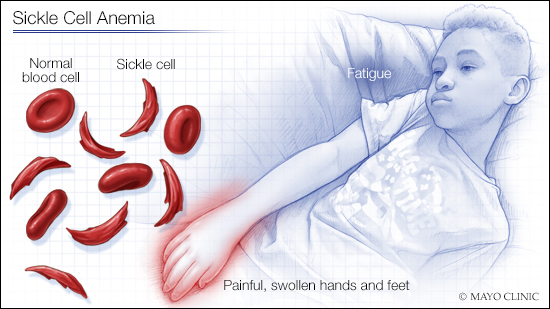-
Sickle cell anemia is an inherited form of anemia
Learn about the symptoms, causes, treatment of this inherited blood disorder that, in the United States, is more common among African Americans.

Sickle cell anemia is an inherited form of anemia — a condition in which there aren't enough healthy red blood cells to carry adequate oxygen throughout your body.
Normally, your red blood cells are flexible and round, moving easily through your blood vessels. In sickle cell anemia, the red blood cells become rigid and sticky and are shaped like sickles or crescent moons. These irregularly shaped cells can get stuck in small blood vessels, which can slow or block blood flow and oxygen to parts of the body.
There's no cure for most people with sickle cell anemia. But treatments can relieve pain and help prevent problems associated with the disease.
Symptoms
Signs and symptoms of sickle cell anemia, which vary from person to person and change over time, include:
- Anemia. Sickle cells break apart easily and die, leaving you without enough red blood cells. Red blood cells usually live for about 120 days before they need to be replaced. But sickle cells usually die in 10 to 20 days, leaving a shortage of red blood cells (anemia).Without enough red blood cells, your body can't get the oxygen it needs to feel energized, causing fatigue.
- Episodes of pain. Periodic episodes of pain, called crises, are a major symptom of sickle cell anemia. Pain develops when sickle-shaped red blood cells block blood flow through tiny blood vessels to your chest, abdomen and joints. Pain can also occur in your bones.The pain varies in intensity and can last for a few hours to a few weeks. Some people have only a few pain episodes. Others have a dozen or more crises a year. If a crisis is severe enough, you might need to be hospitalized. Some adolescents and adults with sickle cell anemia also have chronic pain, which can result from bone and joint damage, ulcers and other causes.
- Painful swelling of hands and feet. The swelling is caused by sickle-shaped red blood cells blocking blood flow to the hands and feet.
- Frequent infections. Sickle cells can damage an organ that fights infection (spleen), leaving you more vulnerable to infections. Doctors commonly give infants and children with sickle cell anemia vaccinations and antibiotics to prevent potentially life-threatening infections, such as pneumonia.
- Delayed growth. Red blood cells provide your body with the oxygen and nutrients you need for growth. A shortage of healthy red blood cells can slow growth in infants and children and delay puberty in teenagers.
- Vision problems. Tiny blood vessels that supply your eyes may become plugged with sickle cells. This can damage the retina — the portion of the eye that processes visual images, leading to vision problems.
Causes
Sickle cell anemia is caused by a mutation in the gene that tells your body to make the red, iron-rich compound that gives blood its red color (hemoglobin). Hemoglobin allows red blood cells to carry oxygen from your lungs to all parts of your body. In sickle cell anemia, the abnormal hemoglobin causes red blood cells to become rigid, sticky and misshapen.
The sickle cell gene is passed from generation to generation in a pattern of inheritance called autosomal recessive inheritance. This means that both the mother and the father must pass on the defective form of the gene for a child to be affected.
If only one parent passes the sickle cell gene to the child, that child will have the sickle cell trait. With one normal hemoglobin gene and one defective form of the gene, people with the sickle cell trait make both normal hemoglobin and sickle cell hemoglobin. Their blood might contain some sickle cells, but they generally don't have symptoms. But they are carriers of the disease, which means they can pass the gene to their children.
When to see a health care provider
Although sickle cell anemia is usually diagnosed in infancy, if you or your child develops any of the following problems, see your health care provider right away or seek emergency medical care:
- Unexplained episodes of severe pain, such as pain in the abdomen, chest, bones or joints.
- Swelling in the hands or feet.
- Abdominal swelling, especially if the area is tender to the touch.
- Fever. People with sickle cell anemia have an increased risk of infection, and fever can be the first sign of an infection.
- Pale skin or nail beds.
- Yellow tint to the skin or whites of the eyes.
- Signs or symptoms of stroke. If you notice one-sided paralysis or weakness in the face, arms or legs; confusion; trouble walking or talking; sudden vision problems or unexplained numbness; or a headache, call 911 or your local emergency number right away.
Learn more about risk factors, complications and prevention.







